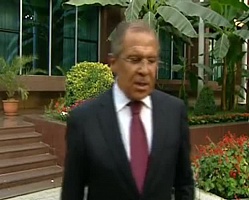Transcript of Foreign Minister Lavrov’s Response to the Question of Russian Media After Attending a Meeting of the CIS Council of Foreign Ministers, Dushanbe, September 2, 2011
Question: How can you assess the results of the CIS activity over 20 years of existence of this structure?
Foreign Minister Lavrov: I think to be satisfied and complacent is the lot of those who have already ceased to work. We derive satisfaction from our work when we achieve results. At today's meeting of the Council of Ministers of Foreign Affairs of the Commonwealth, such results have been achieved; they will be reported to the Heads of State. Tomorrow during the CIS summit the appropriate decisions will be taken.
Today, at the ministerial level, we had a productive exchange of views. Tomorrow there is a presidential-level discussion on the performance of the Commonwealth over the past 20 years and on the likely prospects for the future. An Analytical Report had been issued by the CIS Executive Committee on this theme, which was the basis for discussions. The assessments will be reported to our leaders. A statement highlighting the results achieved and outlining next steps to be taken has been prepared to mark the twentieth anniversary of the Commonwealth of Independent States.
Of course, the CIS is not an ideal structure, and everybody understands that. For obvious reasons 20 years ago something had to be done. Russian leaders have repeatedly emphasized that the successful creation of the Commonwealth is a boon to the peoples of our countries. This is a unique platform for exchange of views, comparison of approaches and communication among the state leaders who not so long ago lived in one country and who are geographically, geopolitically, economically, culturally, and humanitarian wise intertwined by myriad threads. In addition, the Commonwealth (may be, it's not so much noticeable for the press, but noticeable for the citizens and official structures of our countries) is pursuing many useful specific projects both in the struggle against crime, drug trafficking, extremism and terrorism and in the area of migration, demography and cultural policy. The Fund for Humanitarian Cooperation of the CIS is actively functioning, along with the appropriate intergovernmental Council. There are many areas of interaction which at first sight are not visible. Often the media are not interested in successful projects that relate to everyday life and do not enjoy a high profile.
The scope of the foreign ministries' activity, apart from coordinating all the pre-summit arrangements, includes the questions of comparison of the foreign policy approaches. We are increasingly beginning to engage with the content. Today, the heads of the CIS foreign ministries adopted an important statement on "The Complementary and Mutually Beneficial Character of the Development of the Integration Processes." We have the Customs Union and EurAsEC operating within the CIS area, and the Single Economic Space (SES) in the process of formation. The European Union moves forward with its own integration processes; it also has mechanisms that are inclusive of a part of the CIS. It is important that Brussels should honor the prior accords, which essentially stipulate that these integration processes in different parts of Europe and in the Euro-Atlantic region should not be contradictory but complementary to each other. Indeed, a central principle of all these processes is the freedom of movement of capital, goods, services and labor. The Statement, approved by consensus, underlines the willingness of our countries in various formats (this may be a separate country, the Customs Union, EurAsEC, SES, the Commonwealth as a whole) to promote cooperation and contacts with the EU and other integration associations.
Not so long ago at the official level Brussels again stated that our neighbors must choose between Russia and the European Union. These politicized and ideologized statements are contrary to all agreements and elementary logic, to economic and integration tendencies. Given all this, today's Statement is very appropriate and timely.
I will note such a result of the work done as a Draft Agreement to Perpetuate the Memory of the Courage and Heroism of the Peoples of the CIS Member States, prepared for the summit. This document continues the theme of the remembrance of our common Great Victory, which is always present within the CIS framework. A statement to mark the 70th anniversary of the start of the Great Patriotic War was recently adopted. I think that our work in this area is important not only in terms of educating the younger generations, but also in terms of caring for veterans. The heads of our states regularly discuss this theme and adopt the necessary decisions.
A number of practical issues relating to sectoral cooperation in various fields in the context of realizing the CIS Further Development Concept were also considered and recommended for approval by the Heads of State today.
On the whole I am satisfied with the work done. Although problems are aplenty, the fact that all the states support the activities of the Commonwealth, are present and actively participate in its undertakings, especially within the framework of the sectoral organs where the impact is directly felt in practical life, confirms the relevance of this mechanism.
